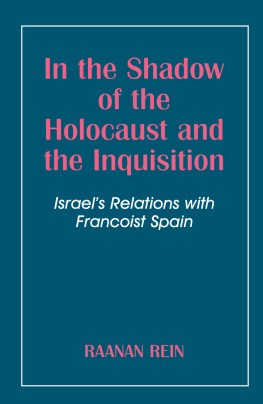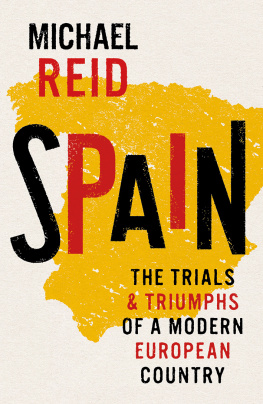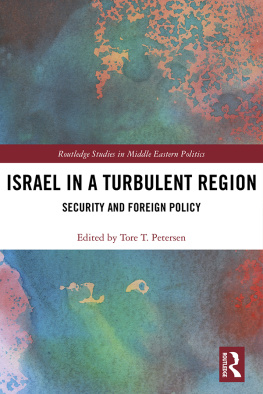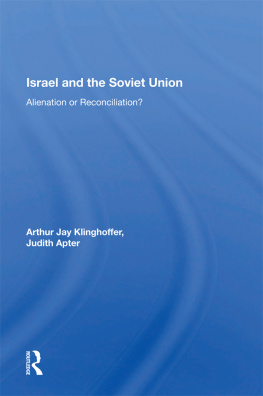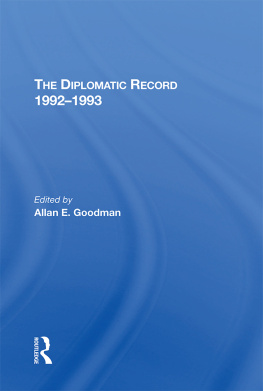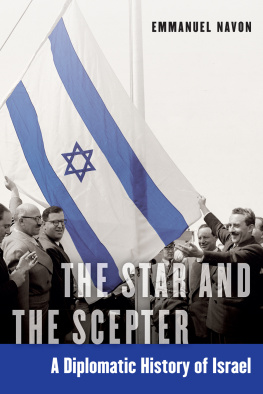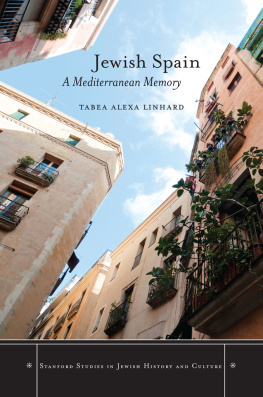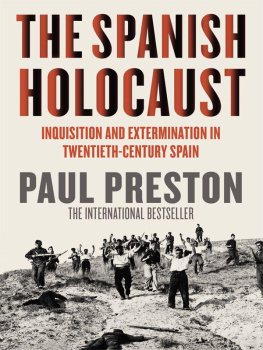First Published in 1997 in Great Britain and in the United States of America by
FRANK CASS & CO. LTD.
Published 2013 by Routledge
2 Park Square, Milton Park, Abingdon, Oxon OX14 4RN
711 Third Avenue, New York, NY 100 l7 USA
Routledge is an imprint of the Taylor & Francis Group, an informa business
Copyright 1997 Raanan Rein
British Library Cataloguing in Publication Data:
Rein, Raanan
In the shadow of the holocaust and the inquisition: Israel's relations with Francoist Spain
1. Israel Foreign relations Spain 2. Spain Foreign relations Israel 20th century
I. Title
327.5'694'046
ISBN 978 0 7146 4796 8 (cloth)
ISBN 978 0 7146 4351 9 (paper)
ISBN 978 1 3150 3679 3 (eISBN)
Library of Congress Cataloging-in-Publication Data:
Rein, Raanan, 1960
[Be-tsel ha-Sho 'ah veha-Inkvizitsyah. English]
In the shadow of the Holocaust and the Inquisition: Israel's relations with Francoist Spain / Raanan Rein: translated by Martha Grenzeback.
p. cm.
Includes bibliographical references and index.
ISBN 978 0-7146-4796-8 (cloth). -- ISBN 978 0-7146-4351-9 (paper).-
ISBN 978 1-3150-3679-3 (eISBN)
1. Israel--Foreign relations--Spain. 2. Spain--Foreign relations--Israel. I. Title.
DS119.8.S68R45 1997
327.4605694--dc21
96-53973
All rights reserved. No part of this publication may be reproduced in any form or by any means, electronic, mechanical, photocopying, recording or otherwise, without the prior written permission of the publisher.
Typeset by Regent Typesetting, London
On 19 January 1986, two days after the formal declaration of diplomatic ties between Madrid and Jerusalem, the Prime Minister of Israel, Shimon Peres, met with his Spanish counterpart, Felipe Gonzlez, at the state guest-house of the Dutch government. After the meeting, they announced to the many journalists waiting outside that a new chapter was beginning in Hispano-Israeli relations. Both leaders stressed that a historical link had been restored in the relations between their nations, a link broken some 500 years previously. Gonzlez spoke of correcting the historical mistake of expelling the Jews from Spain and severing the fruitful connection between the two Mediterranean peoples. Peres emphasized that, in Israel's view, its relations with Spain were unlike its relations with any other country. He mentioned the 'Golden Age' of the Jews of Spain and the distinguished figures whose names are associated with that period, such as Maimonides, Yehuda Halevy, and others; but he stressed: 'We also carry in our hearts the memory of the expulsion of the Jews from Spain.'
All these declarations contained a certain measure of exaggeration and distortion. Political leaders and the mass media both tend to glorify political moves and attribute a dramatic and historical dimension to them. It is difficult, however, to find any real link between the order of expulsion issued by the Catholic rulers Ferdinand and Isabella at the end of the fifteenth century and the relationship between two sovereign states, Spain and Israel, in the second half of the twentieth century. If Spain had a moral obligation or a historical debt, it was not to the political entity represented by the state of Israel, but rather to the Jewish people. Indeed, from the end of the nineteenth century on, Spain began, slowly and hesitantly, to Gradually, long before the establishment of a Jewish state, Jews began to settle in Spain again, and Madrid opened its arms to them. Much later, during the mid-1980s, Spain's decision makers were not influenced by notions of moral obligation so much as they were by political and economic issues and by a concern for the country's international image.
Peres and Gonzlez were in fact closing a circle with a much smaller radius one that had begun when the newly declared state of Israel had chosen to adopt a hostile attitude towards the rgime of the dictator Francisco Franco. Israel's resolute policy against Spain was fuelled not by the memory of the expulsion of the Jews and the persecutions of the Inquisition, but rather by a series of complex images, positions, and decisions. The factors that shaped the Israeli policy included recent memories of the Francoist rgime's evident support for the Nazi rgime during the Second World War; the understandable personal and ideological anti-Francoist commitment that many officials in the Foreign Ministry and the political administration had harbored since the days of the Spanish Civil War; pragmatic foreign policy considerations; and concern about international public opinion and the views of political parties at home.
The situation was similar in Spain. Madrid did not court Israel's favour in the first years of its existence out of a desire to do penance for the 'historical wrong' done to the Jews, but primarily for manifest motives of realpolitik. After three years of a very bloody civil war, Franco had ascended to power with the support of Hitler and Mussolini, and he had adopted a policy of friendly neutrality towards the Axis in the Second World War; he was well aware that establishing ties with Israel, the Jewish state, would help him differentiate his rgime from Italian Fascism and German Nazism, which were associated with anti-Semitism and racism.
In the years after the Second World War years that were critical for his rgime Franco turned to Peronist Argentina for economic aid, namely food to feed his people (at least some of whom were nearly starving) and to prevent food riots that would endanger his government. He also tried to mend fences with the United States, seeking strategic support for his anti-communist rgime in that period when the Cold War was developing rapidly. What he wanted from Israel was the moral legitimation that would help him break through the international boycott imposed on him and expedite an agreement with the United States.
Spain, trying to rehabilitate its image in the West, did not overlook either the potential moral impact of establishing ties with Israel or the influence of Jews around the world, particularly Jews in the United States. This desire for moral legitimacy in the West was also a central motive behind the Francoist rgime's declared policy of tolerance and even sympathy for the Jews of Spain. Franco could not afford to treat the little Jewish community in his country in any way that might give rise to anti-Spanish propaganda in sister communities throughout the Jewish world.
This book seeks to present, for the first time, a thorough analysis of the relations between Spain and Israel, focusing on the years 1948-56 but examining them against the background of both nations' historical memories. Israel's Spanish policy and Madrid's attitude towards the Middle East are studied here within the general context of Israeli foreign policy, Francoist foreign policy, and Spain's position in the international arena in those years. How did Nationalist Spain, ruled as it was by a conservative military dictatorship that showed fascist leanings at the end of the 1930s and the beginning of the 1940s, see Jews, the State of Israel, and Zionism? How did Israel see Catholic Spain and General Franco's rgime? How far was Spain committed to defending Christianity's holy places and to supporting the Vatican's policy towards the state of Israel? When did the unofficial pro-Francoist lobby that called for normal relations with Madrid begin to develop in Israel, and what groups comprised it? These are some of the questions this work seeks to answer.

